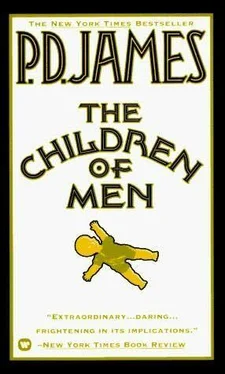He was very dark, with a handsome, rather sulky face, the restless, suspicious eyes bright and deep-set, the brows strong and straight as brush strokes accentuating the jutting cheekbones. The heavy eyelids were spiked with a few black hairs so that the lashes and eyebrows looked joined. The ears were large and prominent, the lobes pointed, pixie ears at odds with the uncompromising set of the mouth and the strong clenched jaw. It was not the face of a man at peace with himself or his world, but why should he be, missing by only a few years the distinction and privileges of being an Omega? His generation, like theirs, had been observed, studied, cosseted, indulged, preserved for that moment when they would be male adults and produce the hoped—for fertile sperm. It was a generation programmed for failure, the ultimate disappointment to the parents who had bred them and the race which had invested in them so much careful nurturing and so much hope.
When he spoke his voice was higher than Theo had expected, harsh-toned and with a trace of an accent which he couldn’t identify. Without waiting for Julian to make any introductions he said: “There’s no need for you to know our surnames. We’ll use forenames only. I’m Rolf and I’m the leader of the group. Julian is my wife. Meet Miriam, Luke and Gascoigne. Gascoigne is his forename. His gran chose it for him in 1990, God knows why. Miriam used to be a midwife and Luke is a priest. You don’t need to know what any of us do now.”
The woman was the only one to come forward and grasp Theo’s hand. She was black, probably Jamaican, and the oldest of the group, older than himself, Theo guessed, perhaps in her mid- or late fifties. Her high bush of short, tightly curled hair was dusted with white. The contrast between the black and white was so stark that the head looked powdered, giving her a look both hieratic and decorative. She was tall and gracefully built with a long, fine-featured face, the coffee-coloured skin hardly lined, denying the whiteness of the hair. She was wearing slim black trousers tucked into boots, a high-necked brown jersey and sheepskin jerkin, an elegant, almost exotic contrast to the rough serviceable country clothes of the three men. She greeted Theo with a firm handshake and a speculative, half-humorous colluding glance, as if they were already conspirators.
At first sight there was nothing remarkable about the boy—he looked like a boy although he couldn’t be younger than thirty-one—whom they called Gascoigne. He was short, almost tubby, crop-haired and with a round, amiable face, wide-eyed, snub-nosed—a child’s face which had grown with age but not essentially altered since he had first looked out of his pram at a world which his air of puzzled innocence suggested he still found odd but not unfriendly.
The man called Luke, whom he remembered Julian too had described as a priest, was older than Gascoigne, probably over forty. He was tall, with a pale, sensitive face and an etiolated body, the large knobbled hands drooping from delicate wrists, as if in childhood he had outgrown his strength and had never managed to achieve robust adulthood. His fair hair lay like a silk fringe on the high forehead; his grey eyes were widely spaced and gentle. He looked an unlikely conspirator, his obvious frailty in stark contrast to Rolf’s dark masculinity. He gave Theo a brief smile which transformed his slightly melancholy face, but did not speak.
Rolf said: “Julian explained to you why we agreed to see you.” He made it sound as if Theo were the supplicant.
“You want me to use my influence with the Warden of England. I have to tell you that I have no influence. I gave up any such right when I relinquished my appointment as his adviser. I’ll listen to what you have to say but I don’t think there’s anything I can do to influence either the Council or the Warden of England. There never was. That’s partly why I resigned.”
Rolf said: “You’re his cousin, his only living relative. You were more or less brought up together. The rumour is that you’re the only one in England he’s ever listened to.”
“Then the rumour is wrong.” Theo added: “What sort of group are you? Do you always meet here in this church? Are you some kind of religious organization?”
It was Miriam who answered. “No. As Rolf explained, Luke is a priest, although he hasn’t a full-time job or a parish. Julian and he are Christians, the rest of us aren’t. We meet in churches because they’re available, they’re open, they’re free and they’re usually empty, at least the ones we choose are. We may have to give this one up. Other people are beginning to use it.”
Rolf broke in, his voice impatient, over-emphatic. “Religion and Christianity have nothing to do with it. Nothing!”
As if she hadn’t heard him, Miriam went on: “All sorts of eccentrics meet in churches. We’re just one set of oddballs among many. No one asks any questions. If they do, we’re the Cranmer Club. We meet to read and study the old Book of Common Prayer.”
Gascoigne said: “That’s our cover.” He spoke with the satisfaction of a child who has learned some of the grown-ups’ secrets.
Theo turned to him. “Is it? So what do you reply when the State Security Police ask you to recite the Collect for the first Sunday in Advent?” Seeing Gascoigne’s embarrassed incomprehension, he added: “Hardly a convincing cover.”
Julian said quietly: “You may not sympathize with us but you don’t have to despise us. The cover isn’t meant to convince the SSP. If they started taking an interest in us no cover would protect us. They’d break us in ten minutes. We know that. The cover gives us a reason, an excuse for meeting regularly and in churches. We don’t publicize it. It’s there if anyone asks, if we need it.”
Gascoigne said: “I know the prayers are called Collects. Do you know the one you asked me?” He wasn’t being accusatory, merely interested.
Theo said: “I was brought up with the old Book. The church my mother took me to as a boy must have been one of the last to use it. I’m a historian. I have an interest in the Victorian church, in old liturgies, defunct forms of worship.”
Rolf said impatiently: “All this is irrelevant. As Julian says, if the SSP take us they’re not going to waste turn examining us on the old catechism. We’re not in any danger yet; not unless you betray us. What have we done so far? Nothing but talk. Before we do act two of us thought it might be sensible to make an appeal to the Warden of England, your cousin.”
Miriam said: “Three of us. It was a majority. I went along with Luke and Julian. I thought it was worth a try.”
Rolf again ignored her. “It wasn’t my idea to get you here. I’m being honest with you. I’ve no reason to trust you and I don’t particularly want you.”
Theo replied: “And I didn’t particularly want to come, so we meet on equal footing. You want me to speak to the Warden. Why don’t you do that yourselves?”
“Because he wouldn’t listen. He may listen to you.”
“And if I agree to see him, and if he does listen, what do you want me to say?”
Now that the question was so baldly put it seemed that they were temporarily nonplussed. They looked at each other as if wondering which one would begin.
It was Rolf who answered: “The Warden was elected when he first took power, but that was fifteen years ago He hasn’t called an election since. He claims to rule by the people’s will, but what he is is a despot and a tyrant.”
Theo said drily: “It would be a brave messenger who was prepared to tell him that.”
Gascoigne said: “And the Grenadiers are his private army. It’s him they take an oath to. They don’t serve the State any more, they serve him. He’s got no right to use that name. My granddad was a private in the Grenadiers. He said they were the best regiment in the British Army.”
Читать дальше












